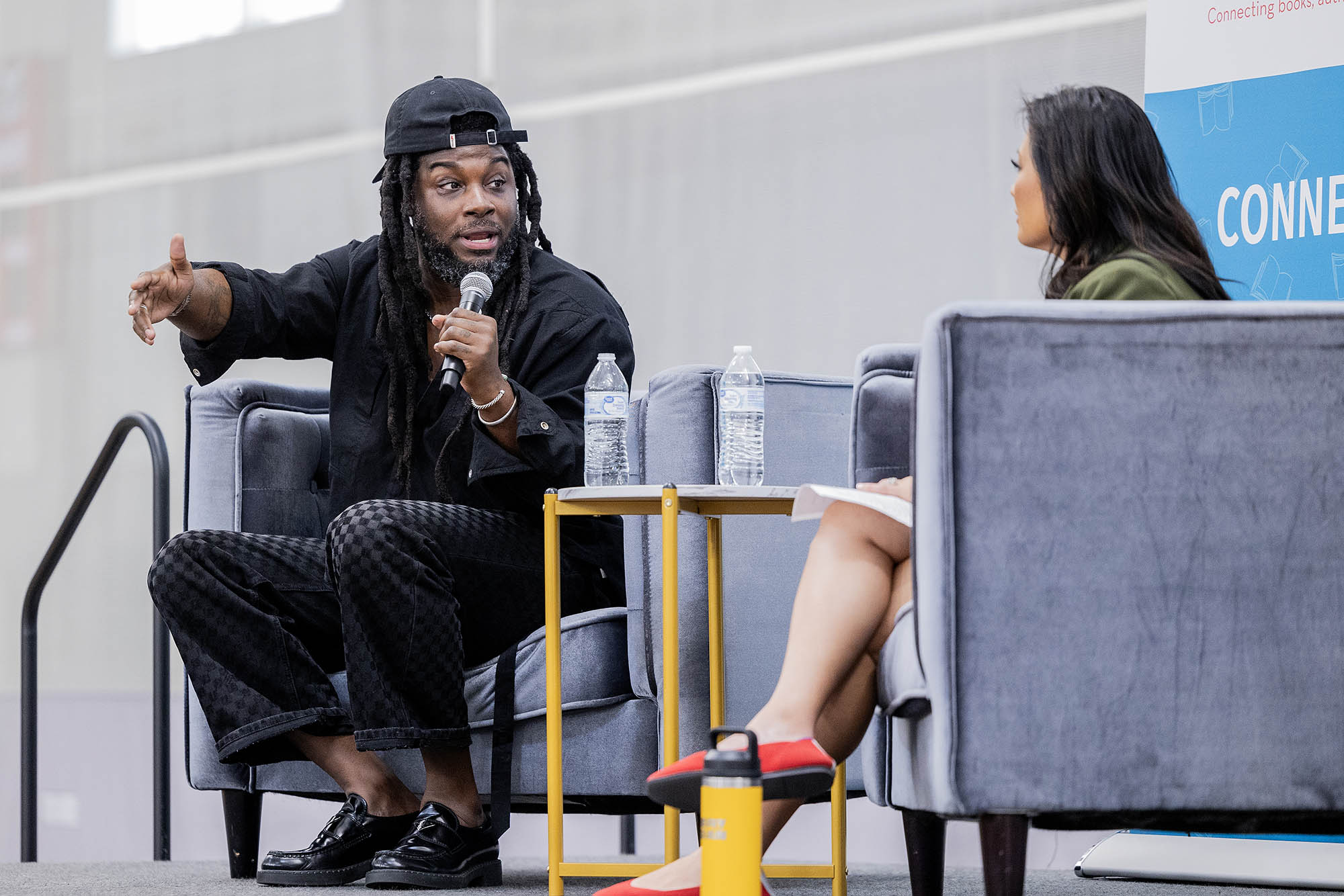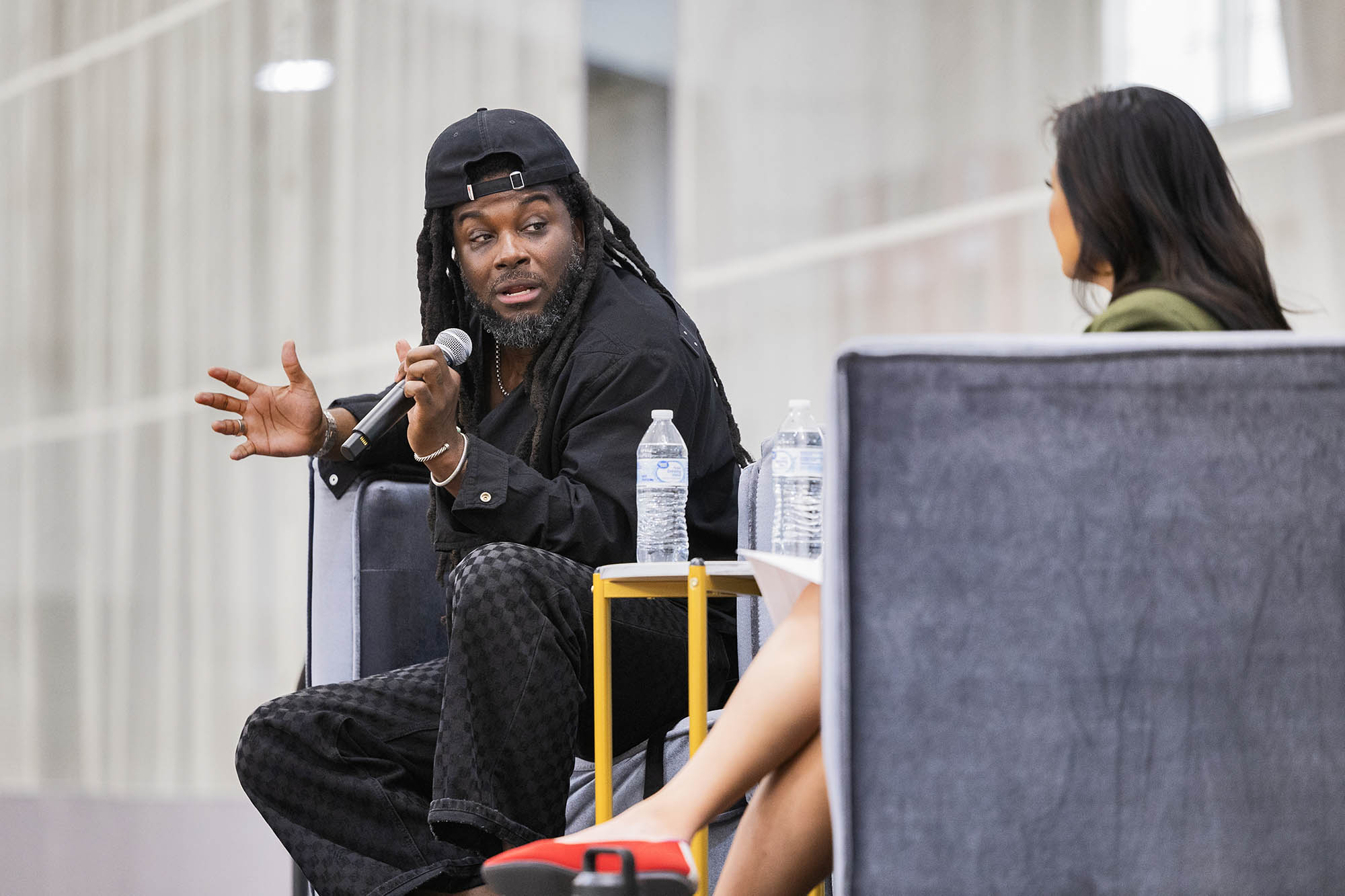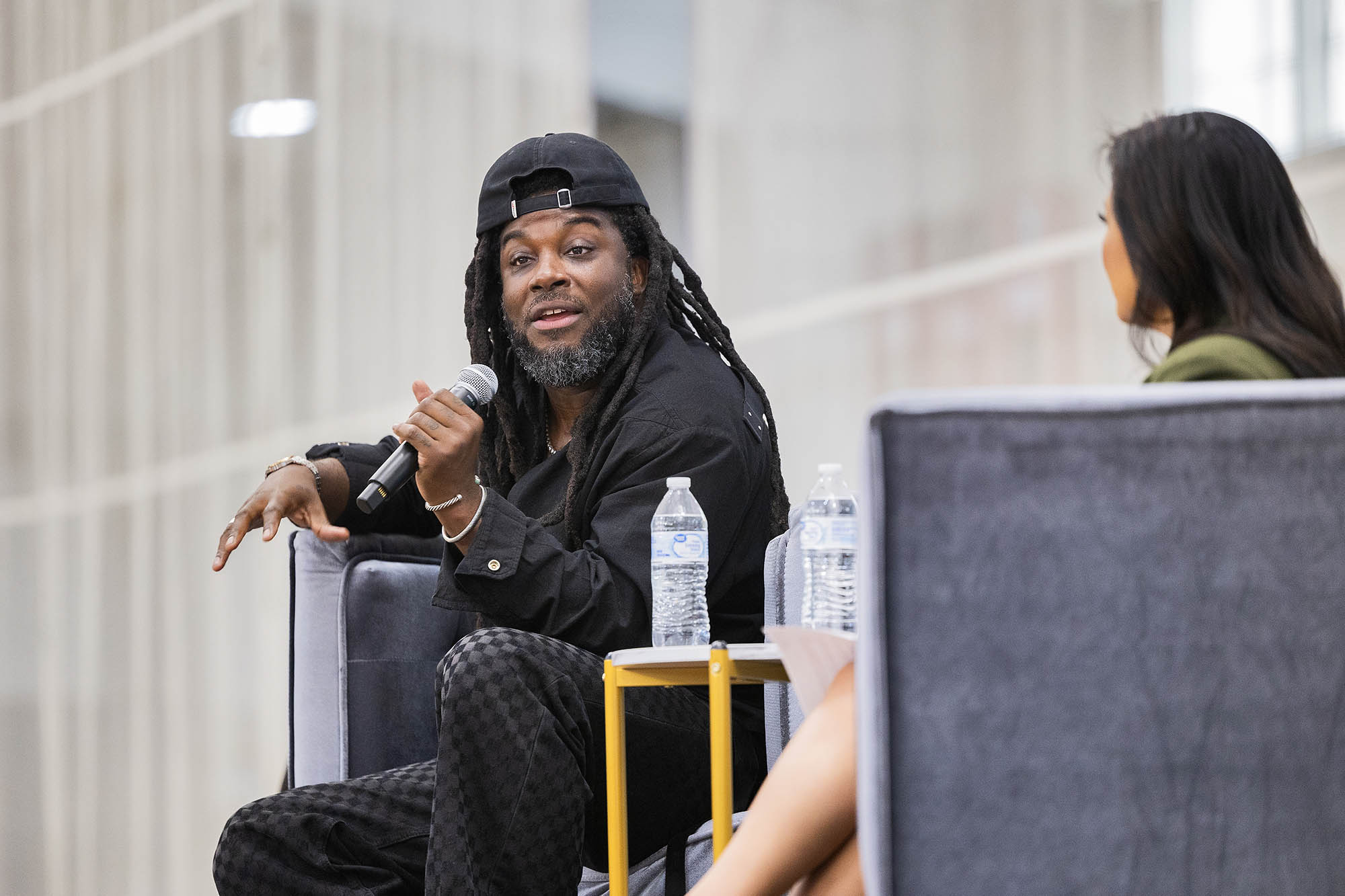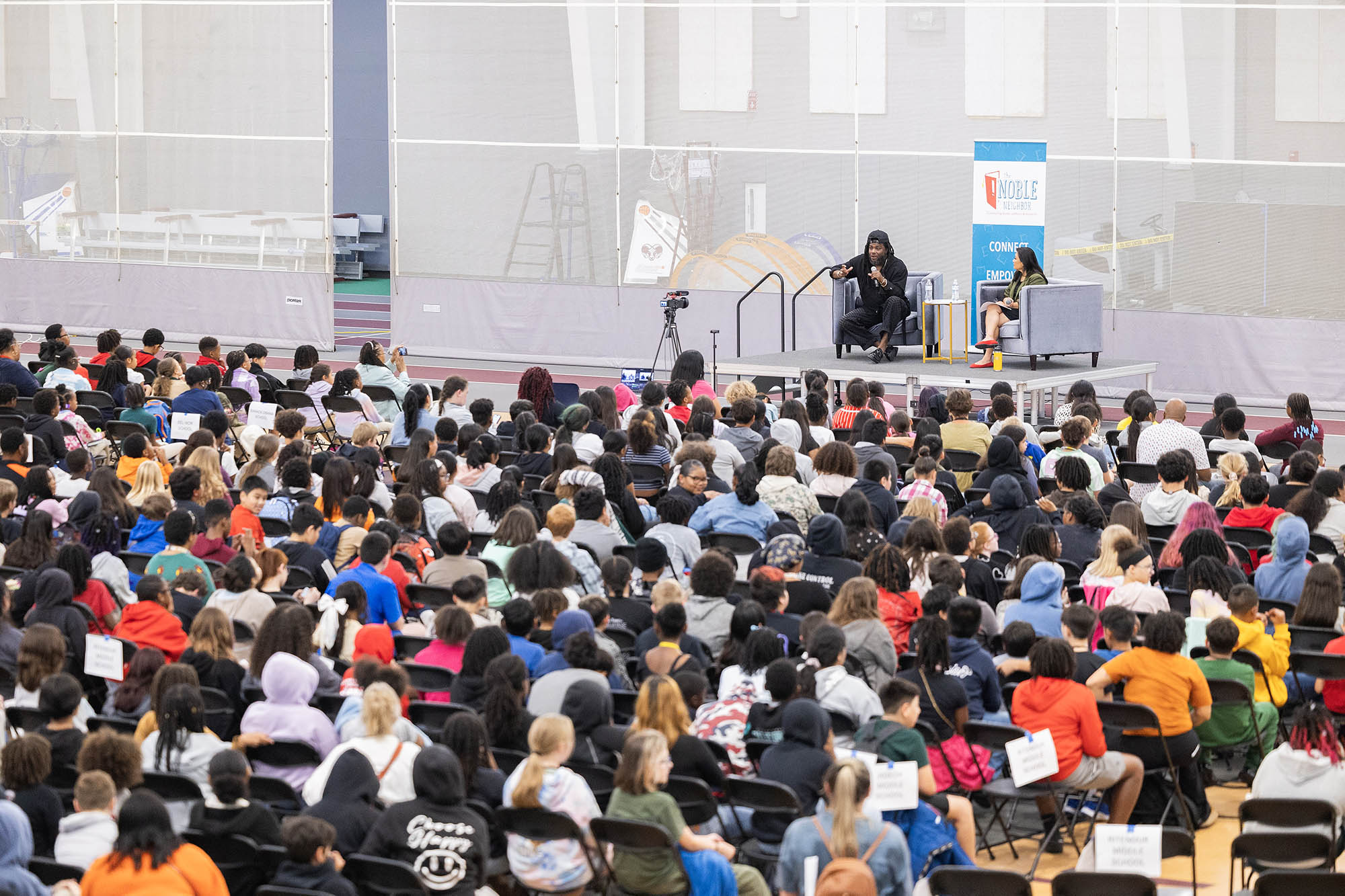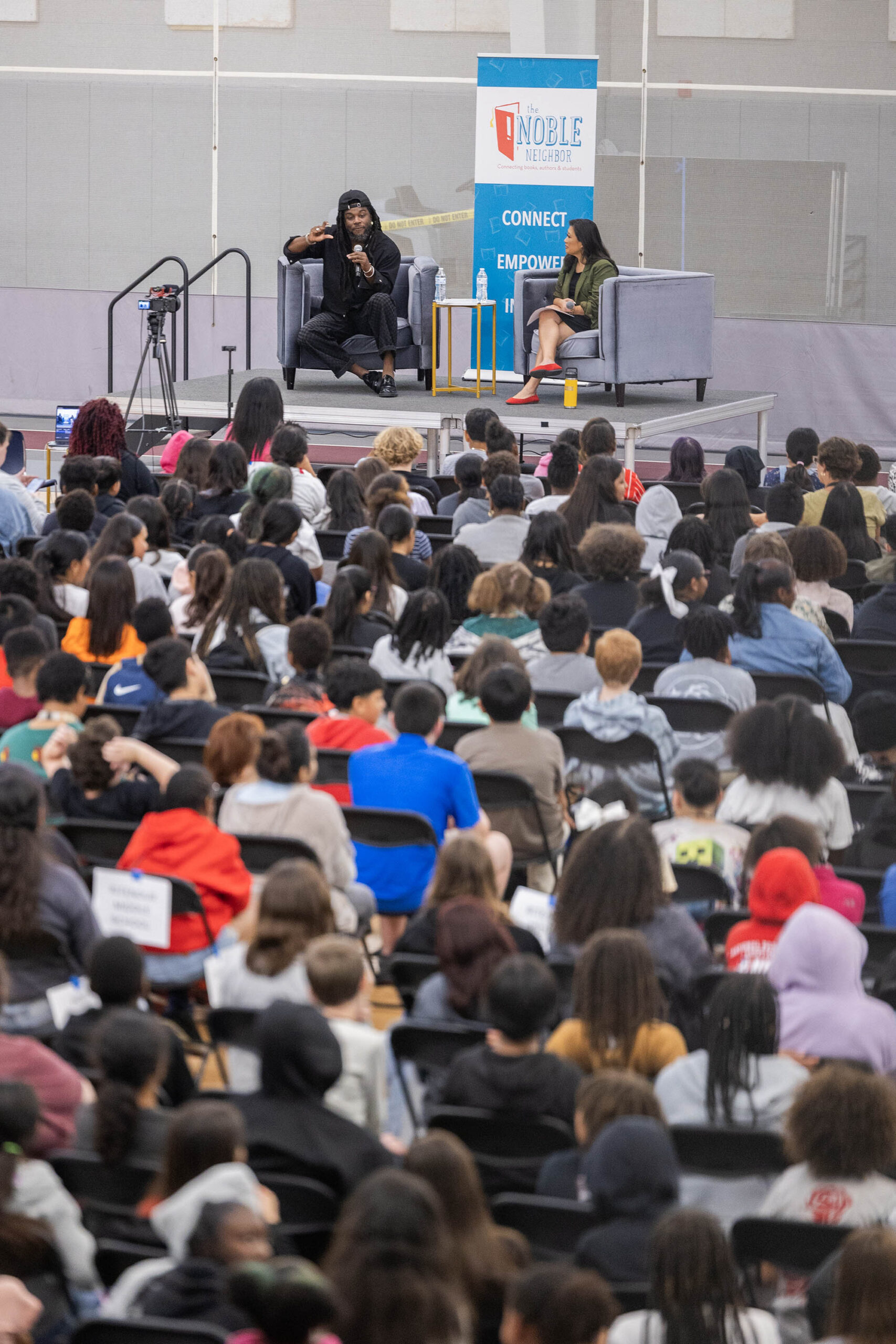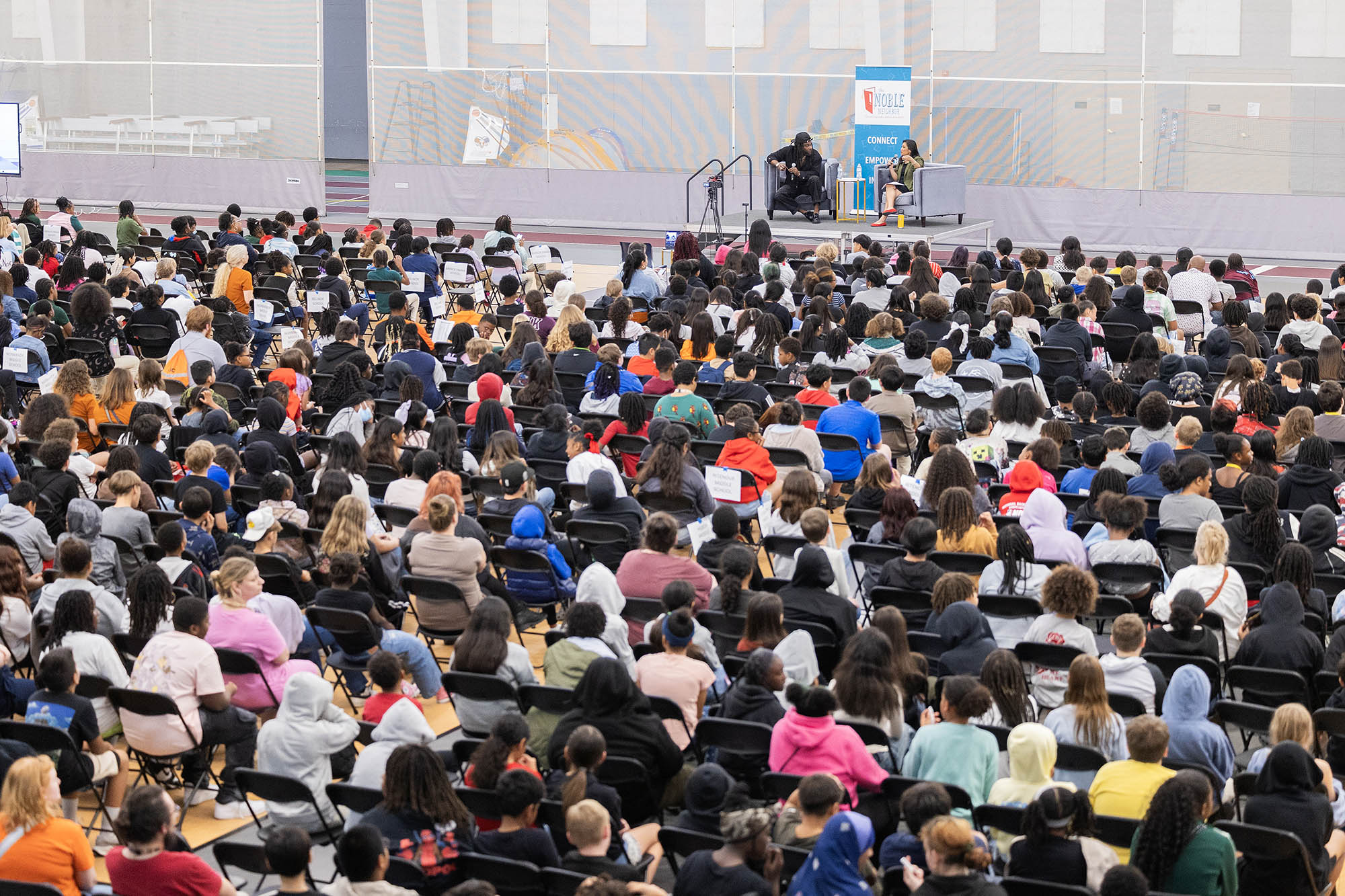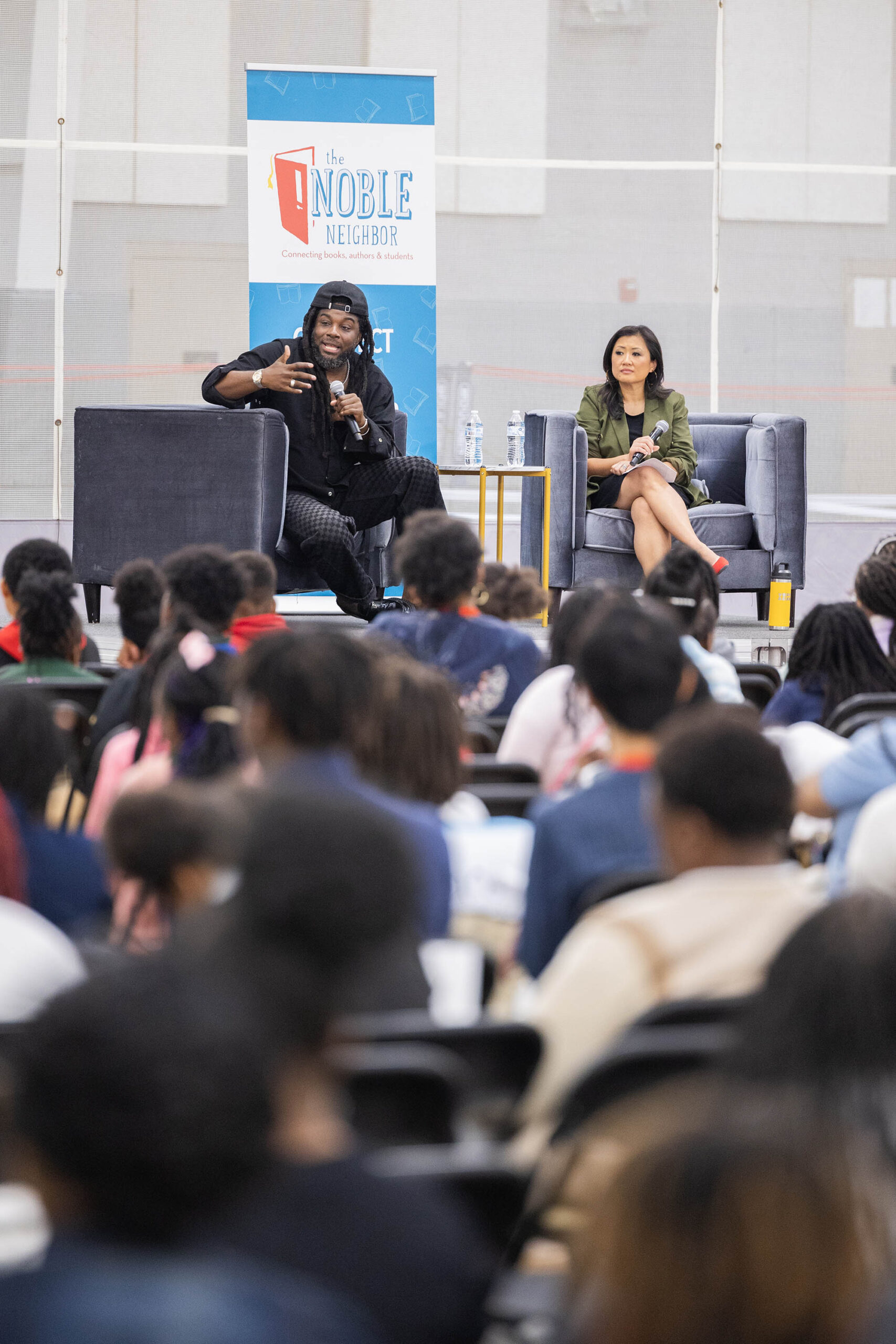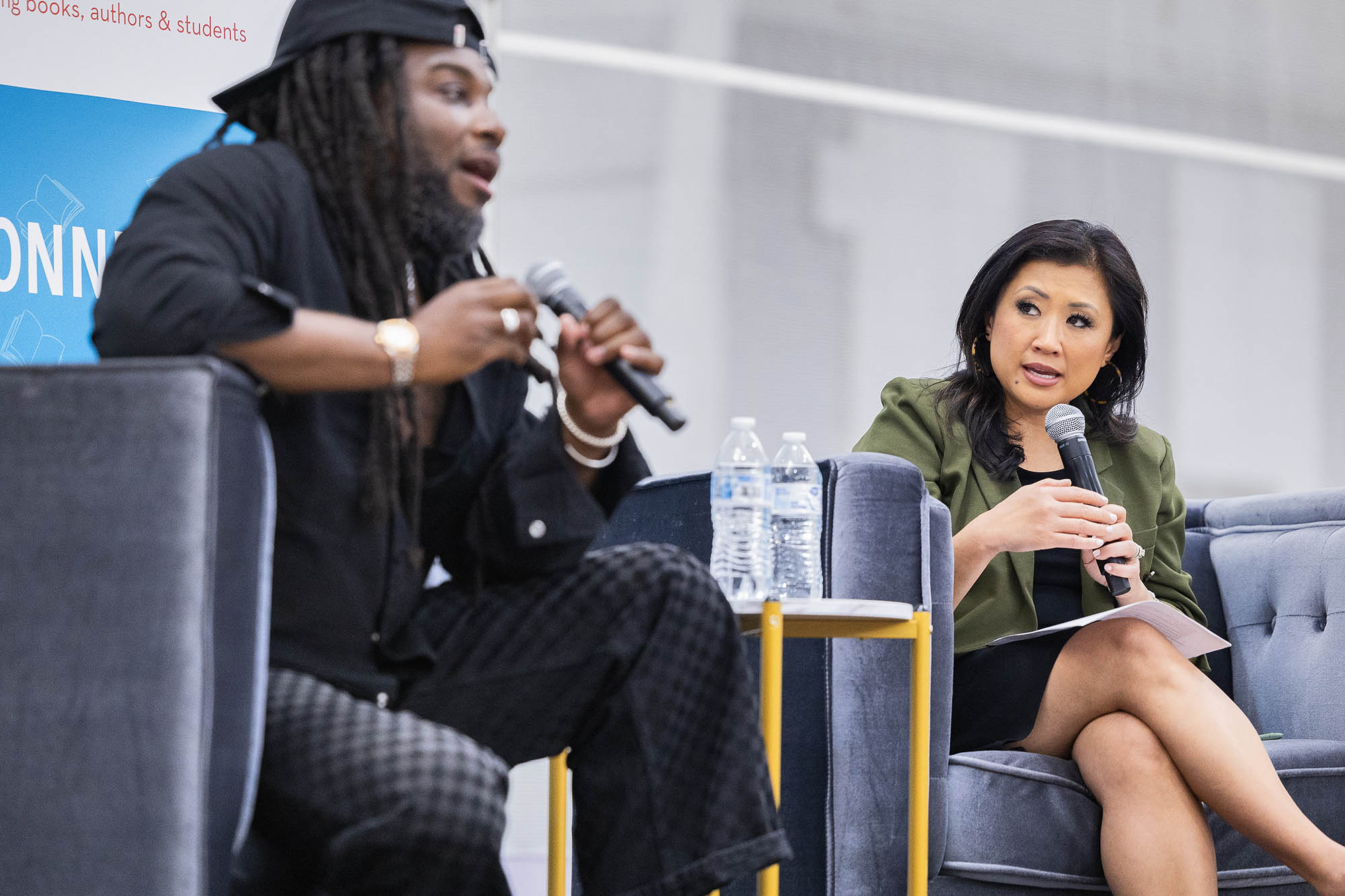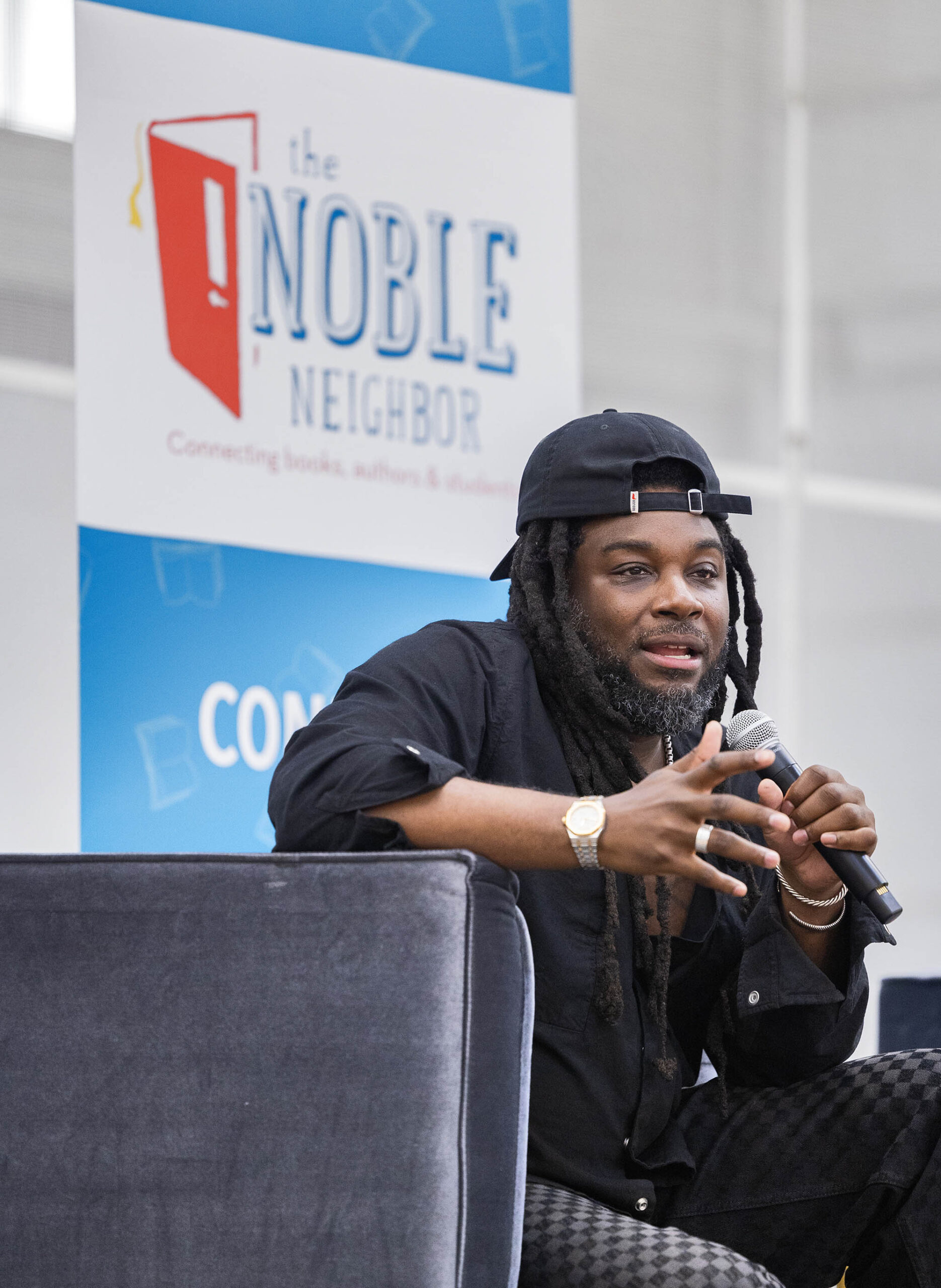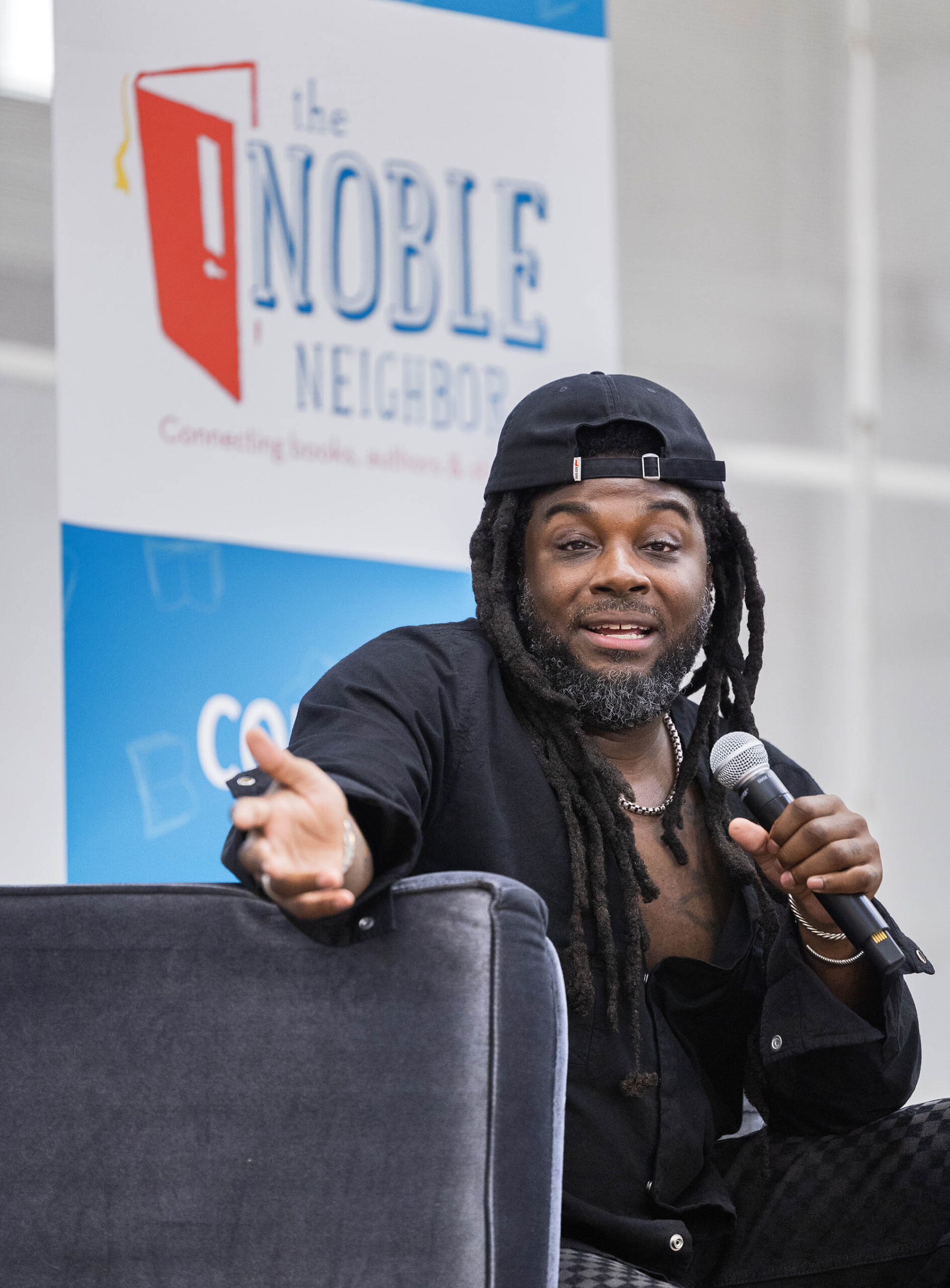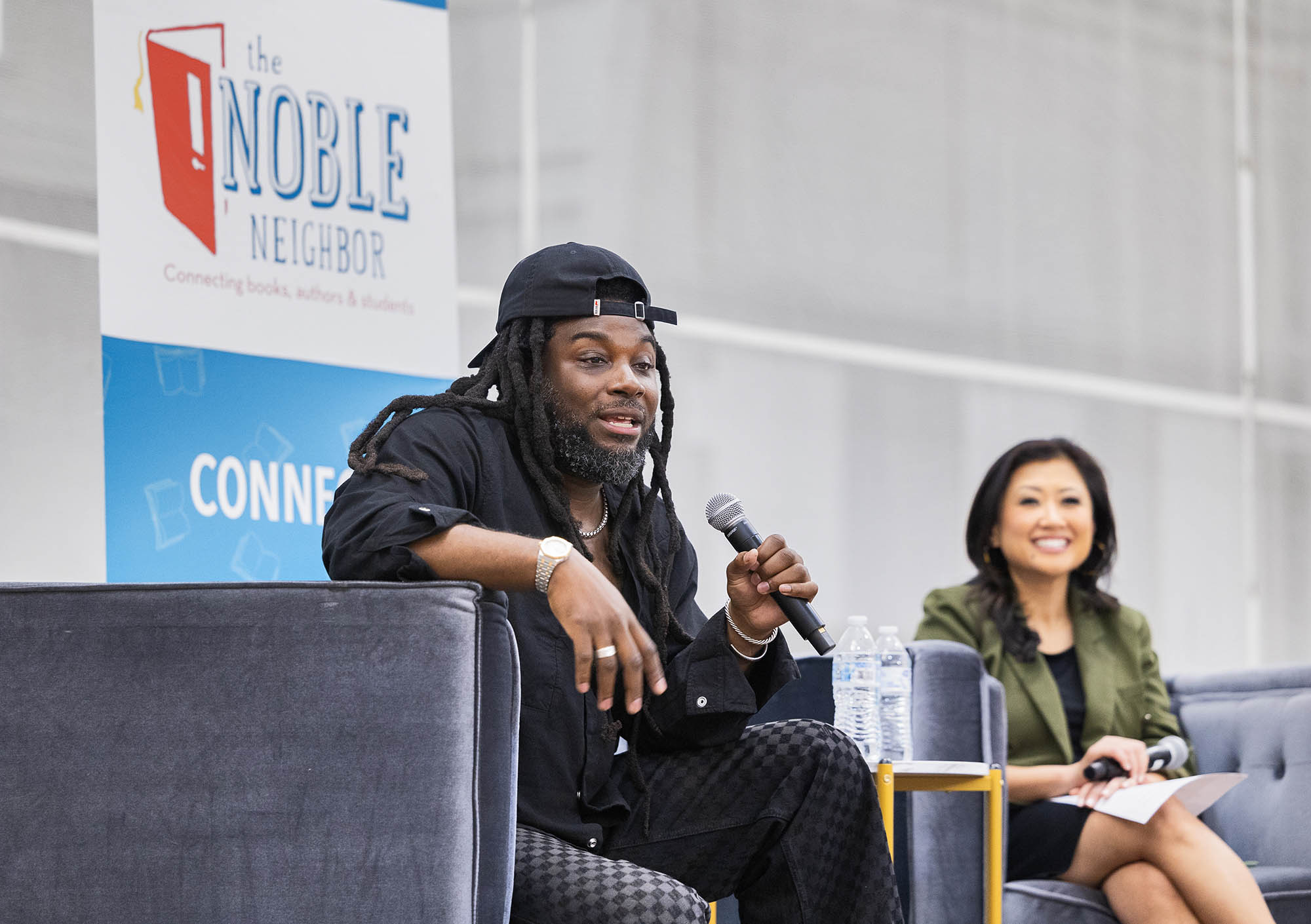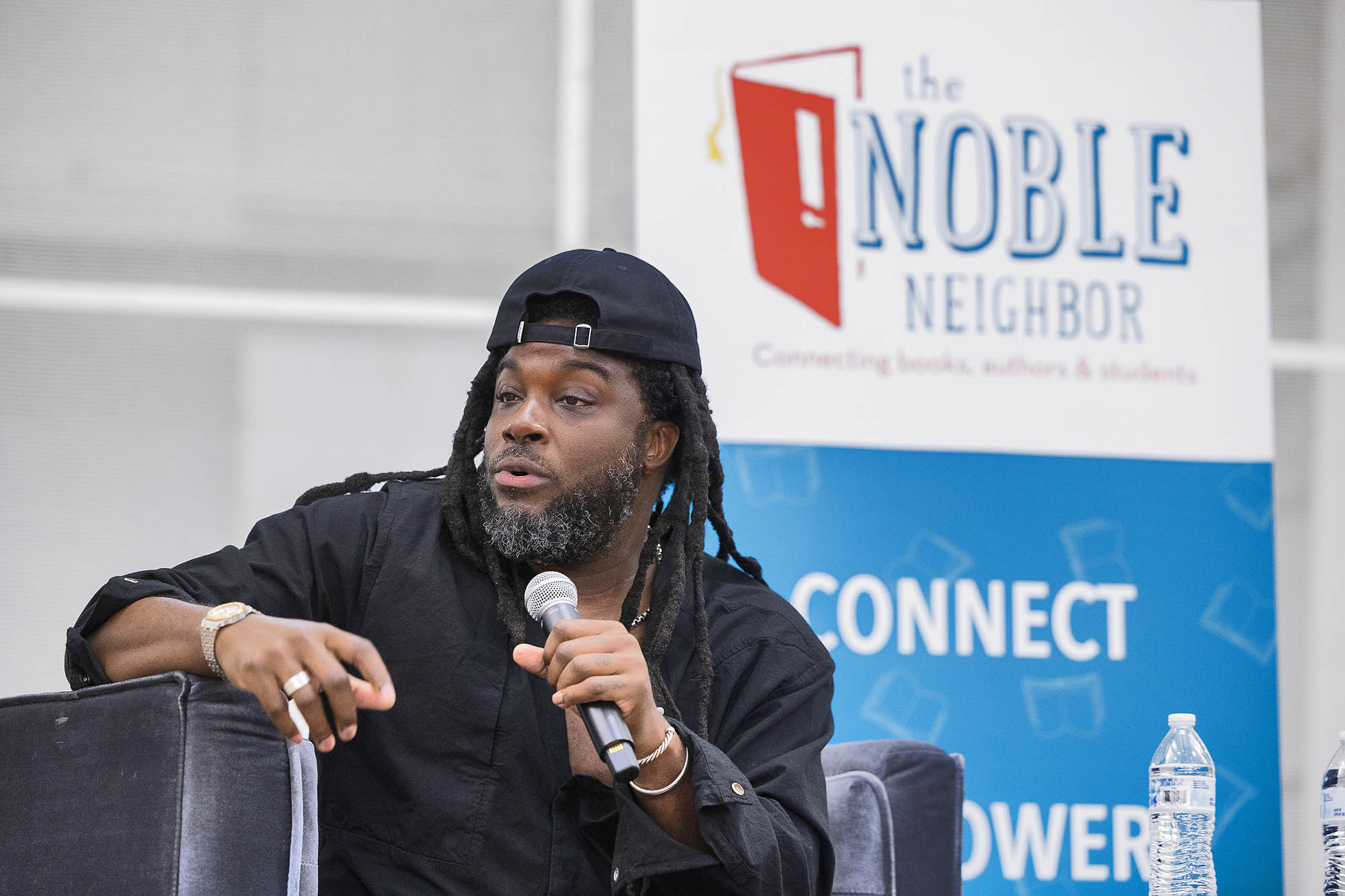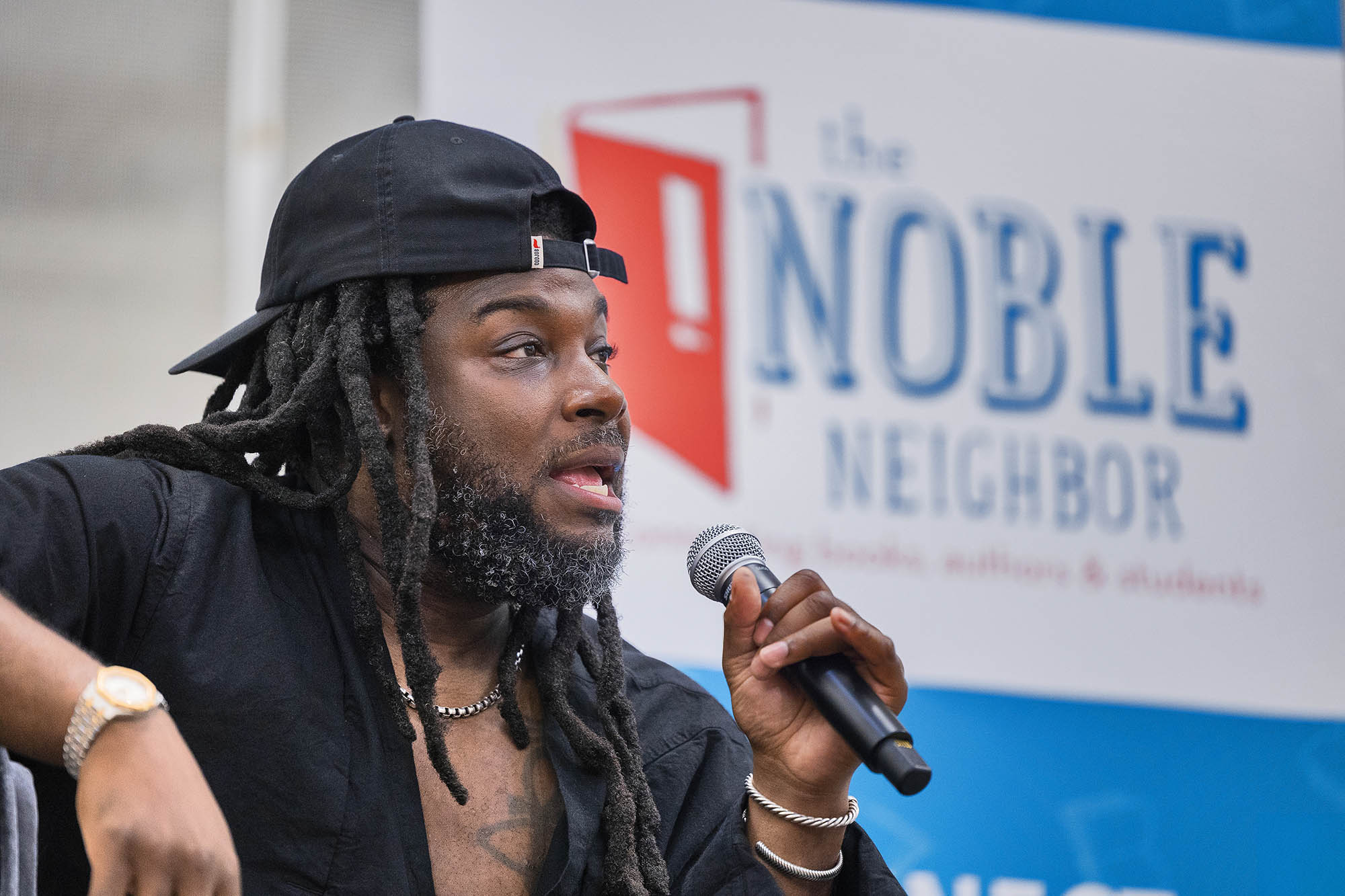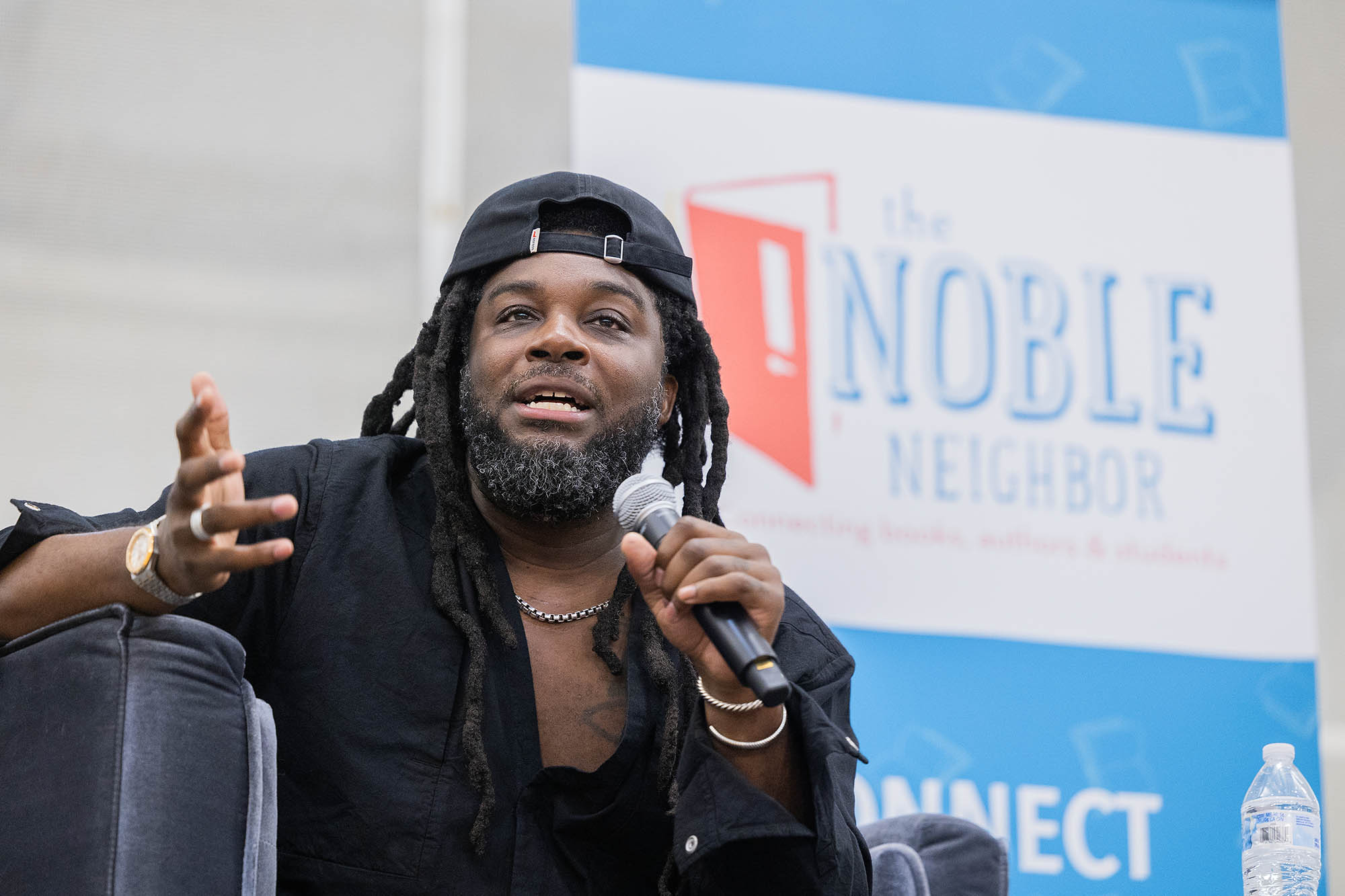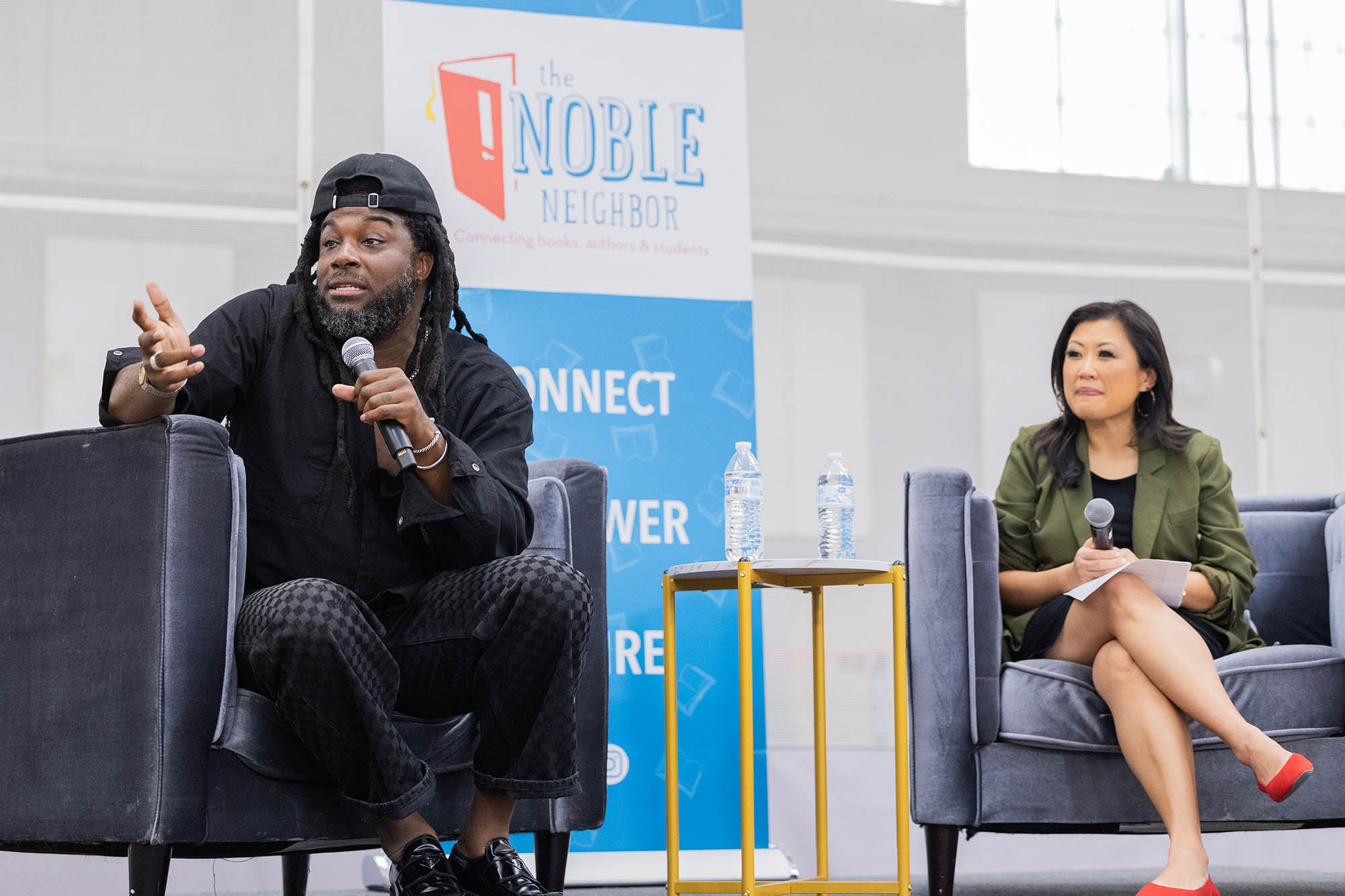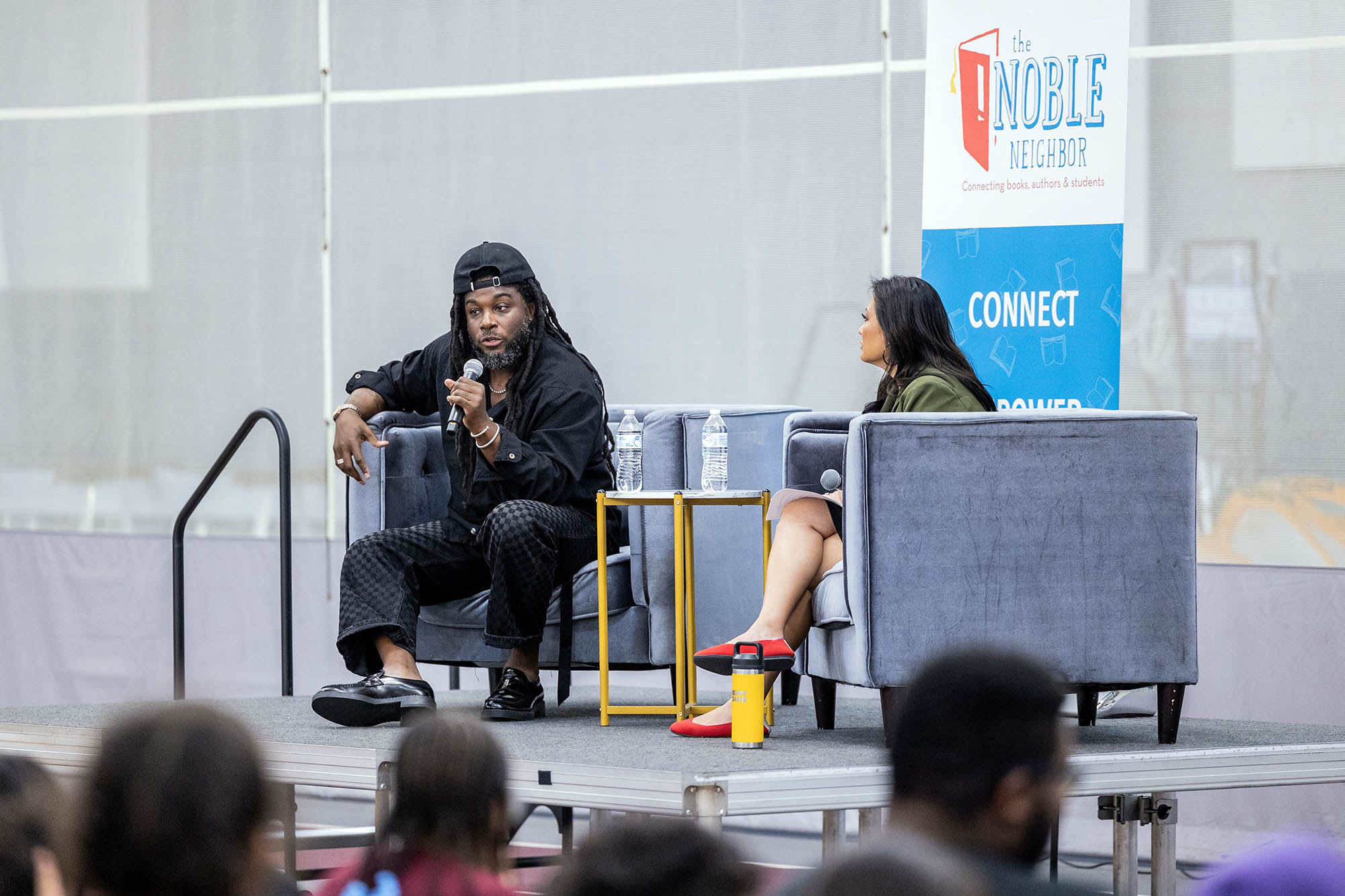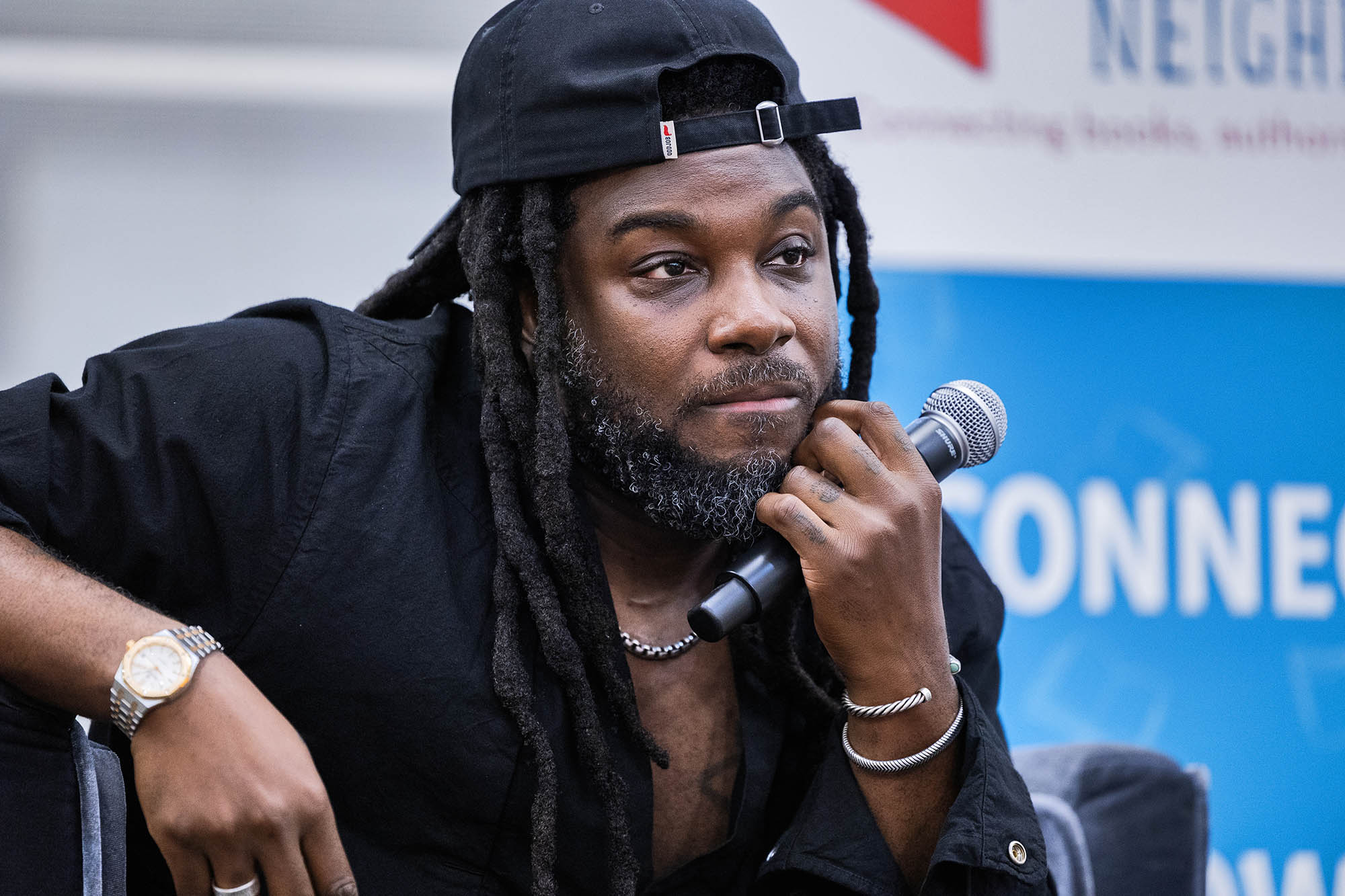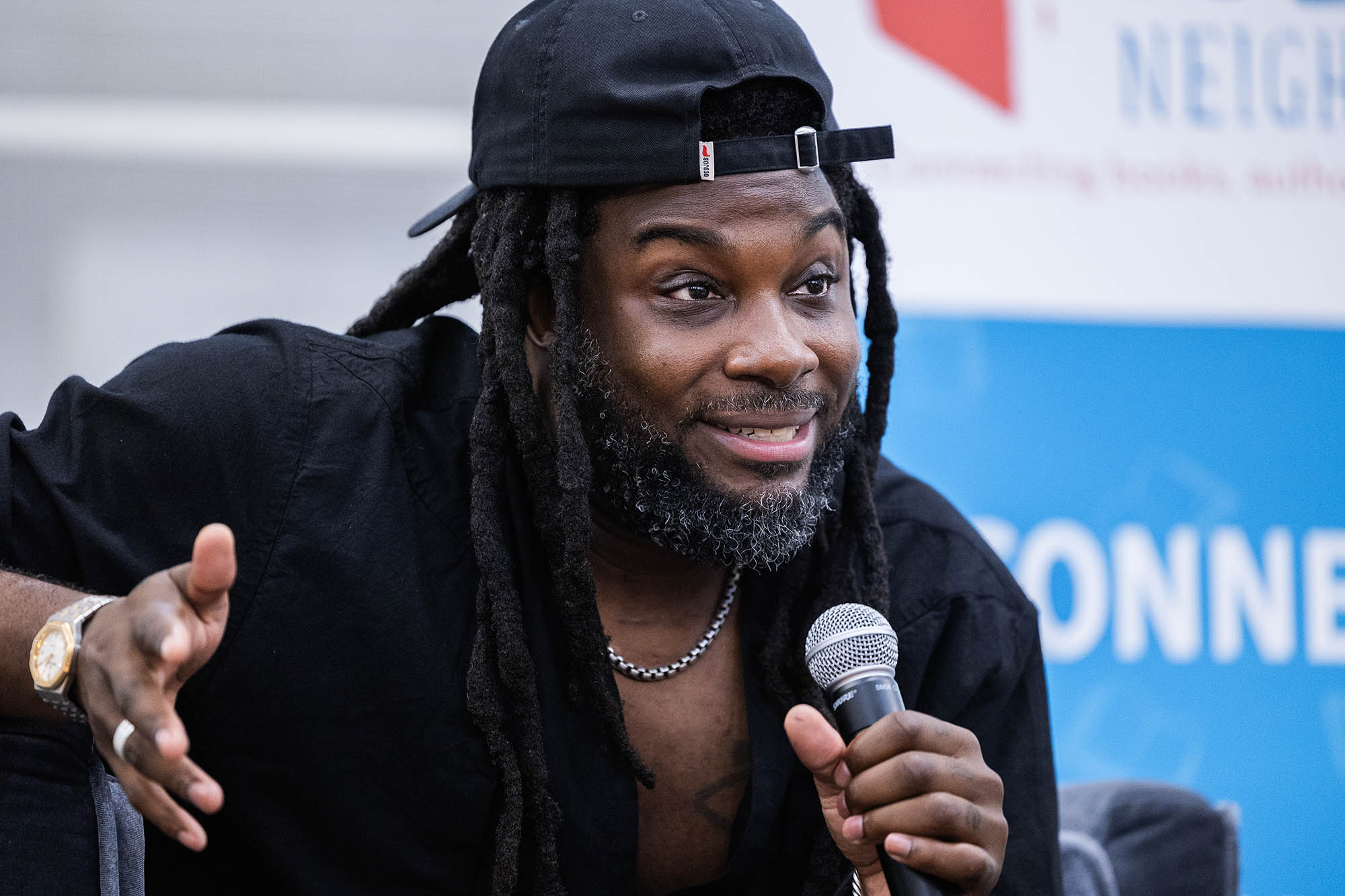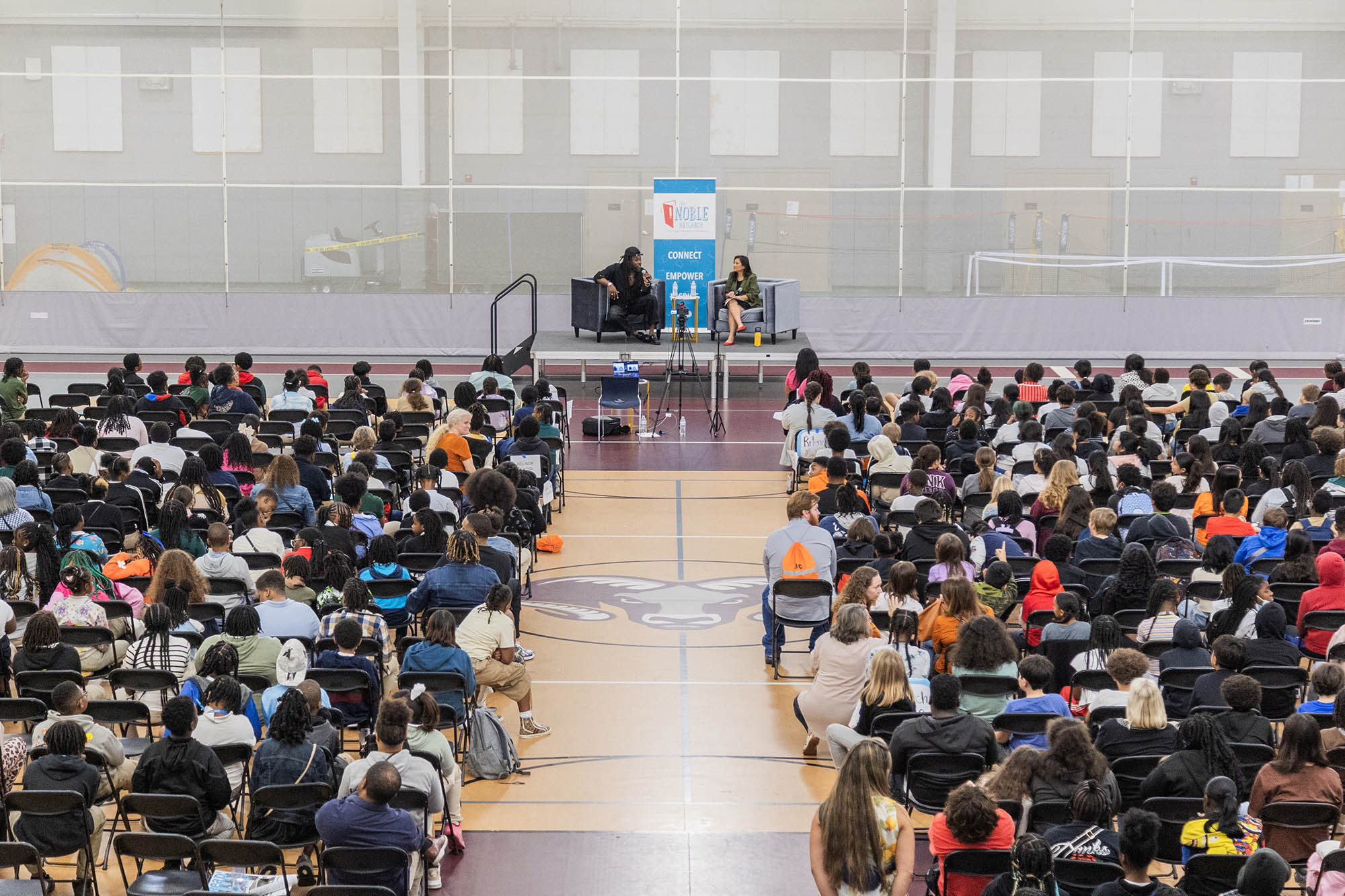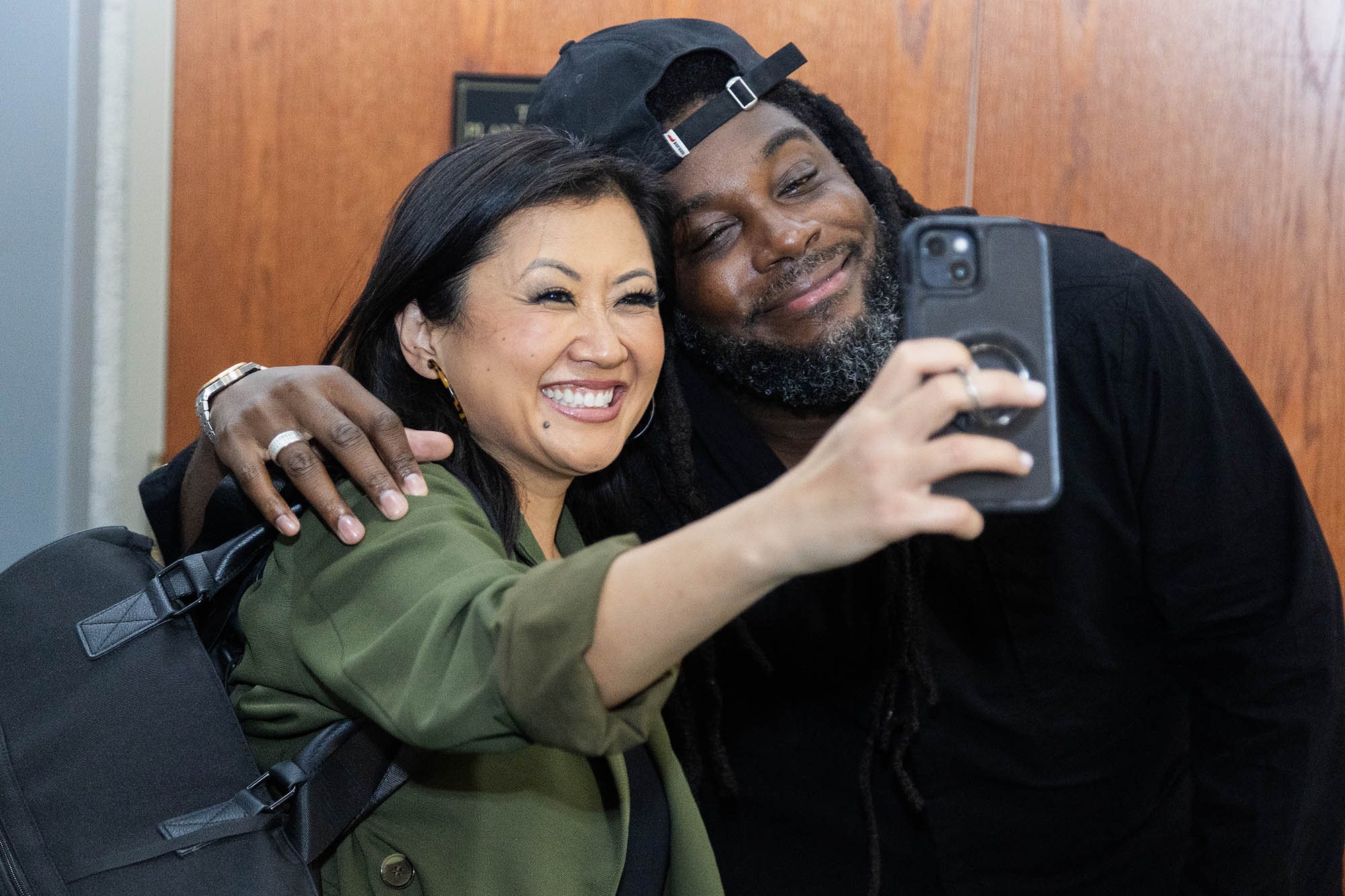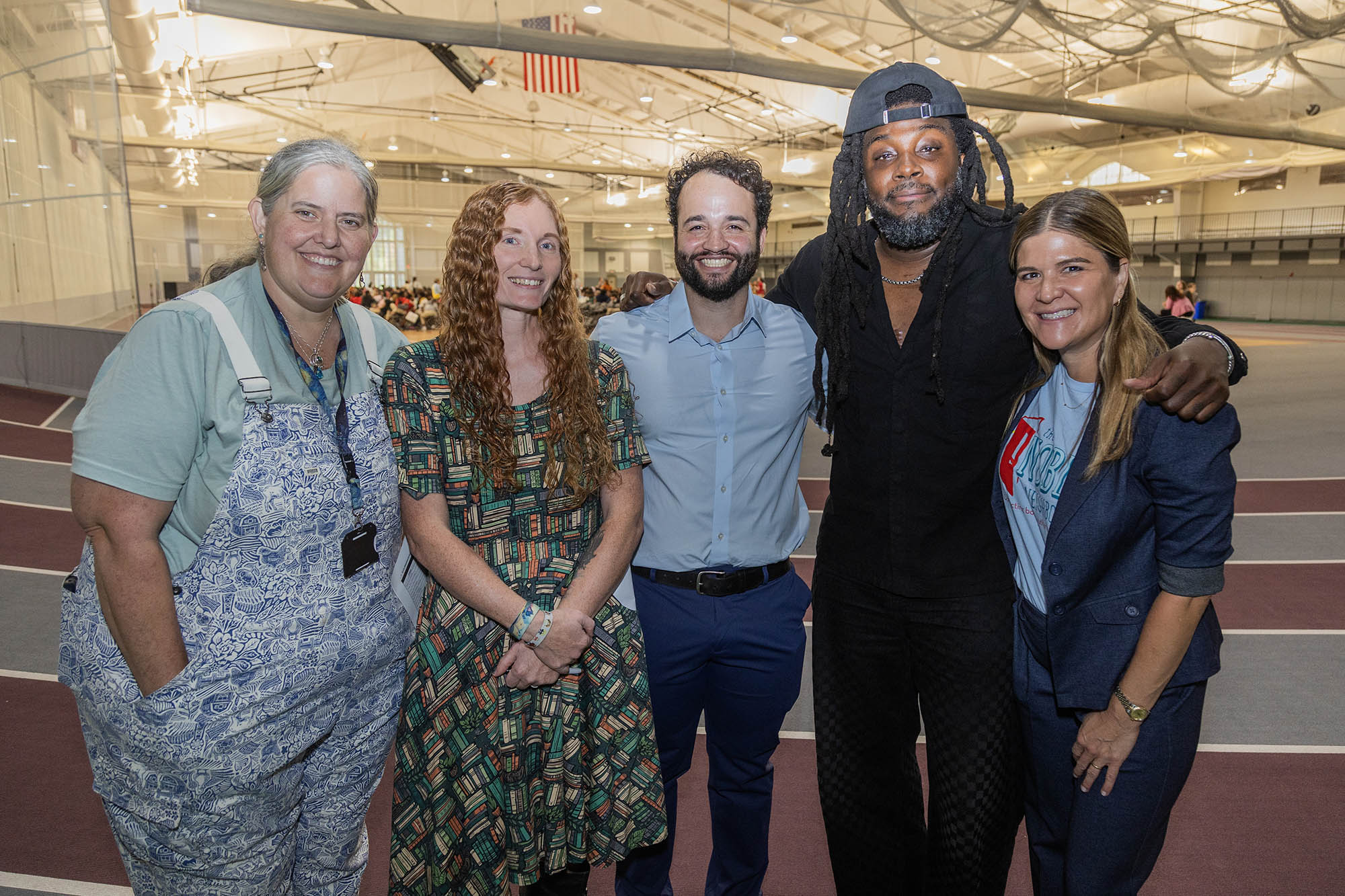MICDS, in partnership with the Noble Neighbor, hosted renowned author Jason Reynolds on Friday, October 17. Due to Reynolds’ popularity, a dozen schools across the area were invited to participate, and the McDonnell Athletic Center quickly filled with students eager to hear from this dynamic writer.
Jason Reynolds is a #1 New York Times bestselling author of many award-winning books, including Look Both Ways: A Tale Told in Ten Blocks, All American Boys (with Brendan Kiely), Long Way Down, Stamped: Racism, Antiracism, and You (with Ibram X. Kendi), Stuntboy, in the Meantime (illustrated by Raúl the Third), and Ain’t Burned All the Bright (with artwork by Jason Griffin). The recipient of a Newbery Honor, a Printz Honor, an NAACP Image Award, and multiple Coretta Scott King honors, Reynolds was also the 2020-2022 National Ambassador for Young People’s Literature. He has appeared on The Late Show with Stephen Colbert, The Daily Show with Trevor Noah, Late Night with Seth Meyers, CBS Sunday Morning, Good Morning America, and various media outlets. He is on faculty at Lesley University for the Writing for Young People MFA Program and lives in Washington, DC.
MICDS parent and local journalist Michelle Li conducted the interview before opening it up for questions. She started by asking the audience to raise their hands if they’ve read one of Reynolds’ books. Many hands shot up, and then she asked them to keep their hands up if they had read two, three, or more of his books. Hopefully, Mr. Reynolds was impressed by how many hands stayed in the air! Li announced that every student was receiving a copy of Reynolds’ newest book, Coach, after the event today, to much applause. Coach is the fifth book in Reynolds’ Track series, about four kids from wildly different backgrounds who are chosen for an elite middle school track team. Their coach, Otie Brody, is the subject of this latest, and last, book in the series.
Li asked Reynolds if he already knew Otie’s story when he was writing the first four books, and how he came to this tale. “I hadn’t really been thinking about it,” Reynolds replied. “I wrote the first four books in that series, and I thought that was going to be it. Then I’m in St. Louis, and Brooklyn, and Australia, and everyone was like, ‘What’s Coach’s story?’ I didn’t think that was a good idea, but then I started to think about what it would be like to go back 40 years. What was it like to grow up in the 1980s? How can I use Coach’s story and use touchpoints from my own life?” He shared how long it took to craft each book, ranging from three weeks to a year. His latest book took a year, partly because he had to go back and reread all four books in the series. He had written other books, returned to his beloved poetry, and worked on a documentary. “I was far away from it,” he admitted.
Reynolds took time to remember his old neighborhood, reading stories about it and considering all the characters and locations and where they fit. “I was writing for a new audience, too,” he said. “I had to think about, if I write Coach now for a reader who hasn’t read the series. So you can read Coach as the fifth book and see how the whole story comes together, or you can read Coach by itself.”
Reynolds shared that his goal isn’t to teach something when he writes for children. “You have parents and teachers and coaches whose job it is to teach you. My job isn’t to do that; it’s to let you know that somebody out here knows you’re alive. I’m thinking about what you’re thinking about, things you’re feeling that you might think are wrong. I feel those things, too. Things you’re scared of; I’m scared of those things too. Do you turn to jokes to survive every day? I know that, too. People who have to take medicine to maintain real life? I know that because I was that. I know you, son. You’re ok, and I love you.”
The author shared that he wasn’t much of a reader when he was a child. He thought a lot of books were boring, and actually still does. “When I was a kid, the expectation was that we read 50 pages before we get to the good part. Get through 10,000 words before anything happens. Nothing else in life works that way. A TV show has two or three minutes, and something happens. Books? This idea that it’s ok to sit and struggle through a hundred pages? I don’t agree. I think books should be entertaining. Just because you read for school doesn’t mean it shouldn’t be fun or entertaining and make you think.”
Reynolds did not read his first book all the way through until he was 17. It was Black Boy by Richard Wright, and Reynolds was in college. “In the second page of the book, the main character sets the curtains on fire. Now we talkin’! This is the book I wanna read because it’s interesting!” He admits now that many of the books his teachers asked him to read were actually ok, “but they got better as I got older.” He started to be able to see the lesson behind those reading assignments, and went back and read all the books.
How did he get started with writing? “I started writing when I was 10,” he said. “Writing saved my life. All the feelings, the secrets that we keep—writing helped me get that stuff out. Rap was just becoming a thing when I was a kid. There are these pamphlets that come with tapes, and they had the lyrics. I read all the words to every song.” He studied the lyrics of rap songs, “and that’s how I discovered poetry, and that saved my life. I could figure out how to get the inside things out.”
“I learned a little bit late. I had an obsession with writing, but didn’t know. Nobody in my family knew anything about writing. Writers didn’t come to schools when I was your age. The fact that I can come holler at you face to face says now you can’t use the excuse that you’ve never met a writer before, seen one, see that one might look just like you. We saw athletes, teachers, hustlers; these were the paths you could take. I’m from DC, so I saw you could work for the government. I wasn’t thinking about this craft at the time. I was thinking, ‘How can I keep myself on the level? How can I save my life?’ My friends could see I had something, so they created a force field around me. I had friends who protected me to do the things I needed to do.”
Li asked Reynolds, “How do you inspire young people to feel a sense of belonging and that they are seen?”
“Nobody is going to be able to tell your story if you really want your story to be told,” he replied, “so write it. If you feel like your version of life hasn’t been represented by anyone else, you write it. My first book came out when I was 16, and I sold it out of the trunk of my mom’s car. Nobody’s story is as important as yours. Other stories are great, but not as great as yours. Other stories are awesome, but not as awesome as yours. You have the obligation and ability to do it. You don’t have to follow the rules or do it in a particular way. You do it how it feels good to you.” He advised that while it’s important to know the rules of writing, just like it’s important to know rules to keep you safe, it’s also good to know how to break those rules.
“Write your story. Tell your story. Sing it if that’s your thing. Draw pictures if that’s your thing. It all counts. Put your story out into the world. One of the biggest mistakes we can make is knowing the things we are afraid to tell and tiptoeing around. The world is the world, and it’s coming. Most of you have experienced things that are difficult. Figure out how to survive. Some of you are first generation in this country and are figuring out language barriers. That’s real. If you know the stress, honor your intelligence by leaning into the tough conversations. We’re gonna meet each other in the middle.”
Reynolds encouraged students to work through the difficult moments. “We go through things. It’s a moment, and then we move on. Figure out how to move through it, carry it with us, find the joke, find the light. I find where are my friends, and we figure it out. That’s what I try to honor.” Reynolds prides himself on talking to students like they’re adults, not children.
Li asked, “What would you say to a student who is hearing you who might not believe that their voice matters?”
“Everyone has their issues, but everybody also has a teacher they know. The teachers who you know? They got you. The coaches, parents, the people you trust and believe in, your friends—if you got haters, haters gotta have something to hate. Which means there’s something about you that’s really good, that’s really valuable, that makes someone else uncomfortable about something they don’t have, to the point where they gotta talk about you. You should see yourself as a valuable thing. Take it from me, I love you. I believe you’re the most intelligent generation to ever live. I’m just waiting for you to realize that.”
Reynolds stressed that it’s important to recognize that hard times and difficult moments are actually essential to a well-lived life. “We don’t want to live in a world without uncomfortable stuff,” he said. “All of you have a story to tell, and I can’t wait to catch up with you in 30 or 40 years.
“Early in my life, my own parents didn’t necessarily believe in me becoming a writer. My friends always did. They wanted me to be safe and go to work. I believed in myself and had my friends to support me even when my family didn’t. They apologized later; we’re all good!
“At times, people have tried to make me feel like my life didn’t matter. All you need is one solid person around you to remind you. You need one person that you trust, a parent, grandparent, or friend. When the people I trust and love tell me I’m great? Believe them.
“The biggest inspiration in my life was probably my own mother. She had it so hard and did so much with so little, and I have no excuses. I look at my mother every day [for inspiration]. Whenever you feel like you couldn’t do something? Change the way you feel about the situation; you can do it.
“Sometimes I write for fun. This is my job, but I still write for fun. Most of the stuff I write for fun, nobody sees, it’s just for me. It’s all terrible, but it’s for me. You don’t always choose the topic, sometimes the topic chooses you. I couldn’t ask for a better life. I get to write and come here and speak with all of you.”
Middle School Librarian Bethany Kavanaugh was thrilled to welcome one of her favorite authors to campus. “Every so often, you come across a writer who truly gets it,” she said. “Jason’s ability to connect with kids is remarkable—he spoke to them with such genuine warmth and authenticity that you could feel the energy in the room. He didn’t just talk at students; he talked with them, meeting them exactly where they are. It’s clear how much he cares about his readers, and his goal of reminding them how important and seen they are was apparent with every word out of his mouth. Our students, and all of those from visiting schools, were captivated and hopefully inspired to get out there and tell their own story however they choose!”
Thank you to Jason Reynolds and the Noble Neighbor for inspiring young writers and readers in St. Louis!
